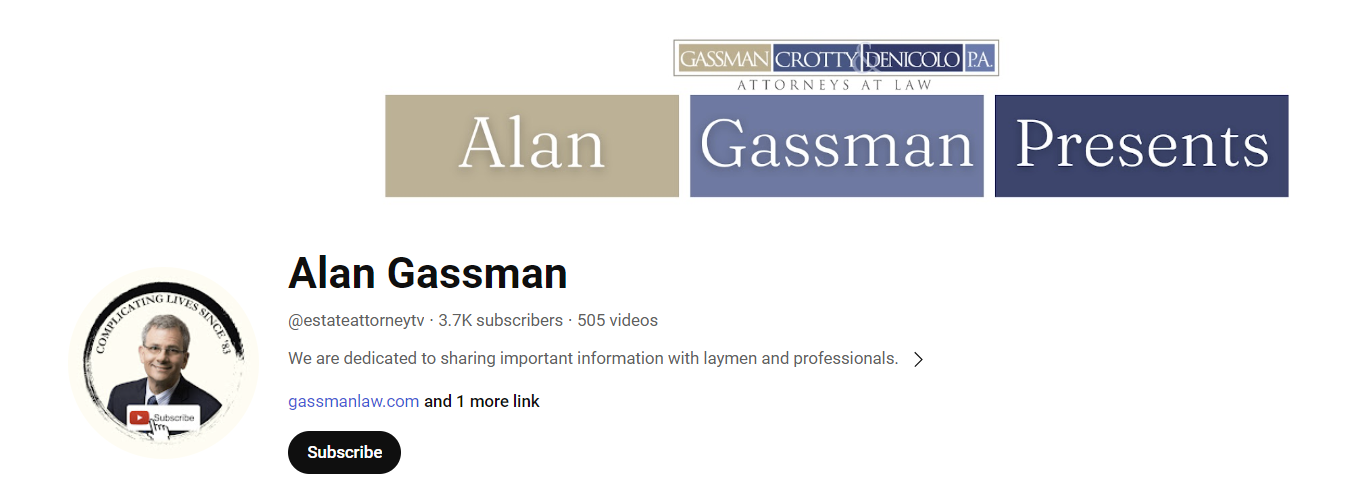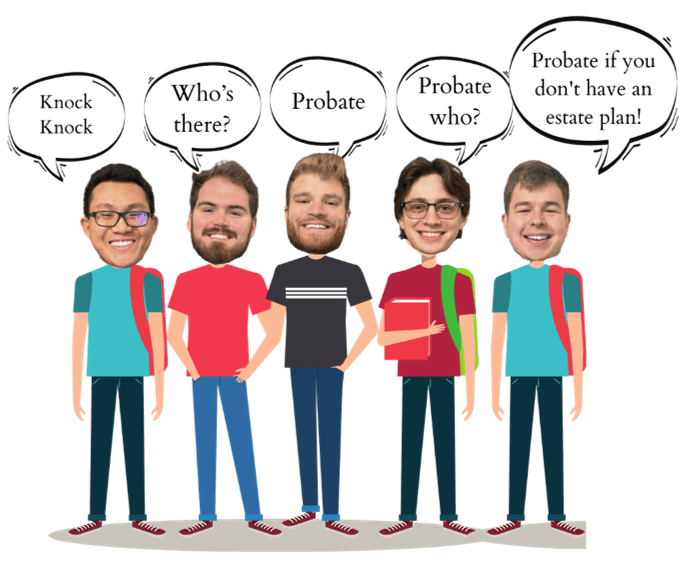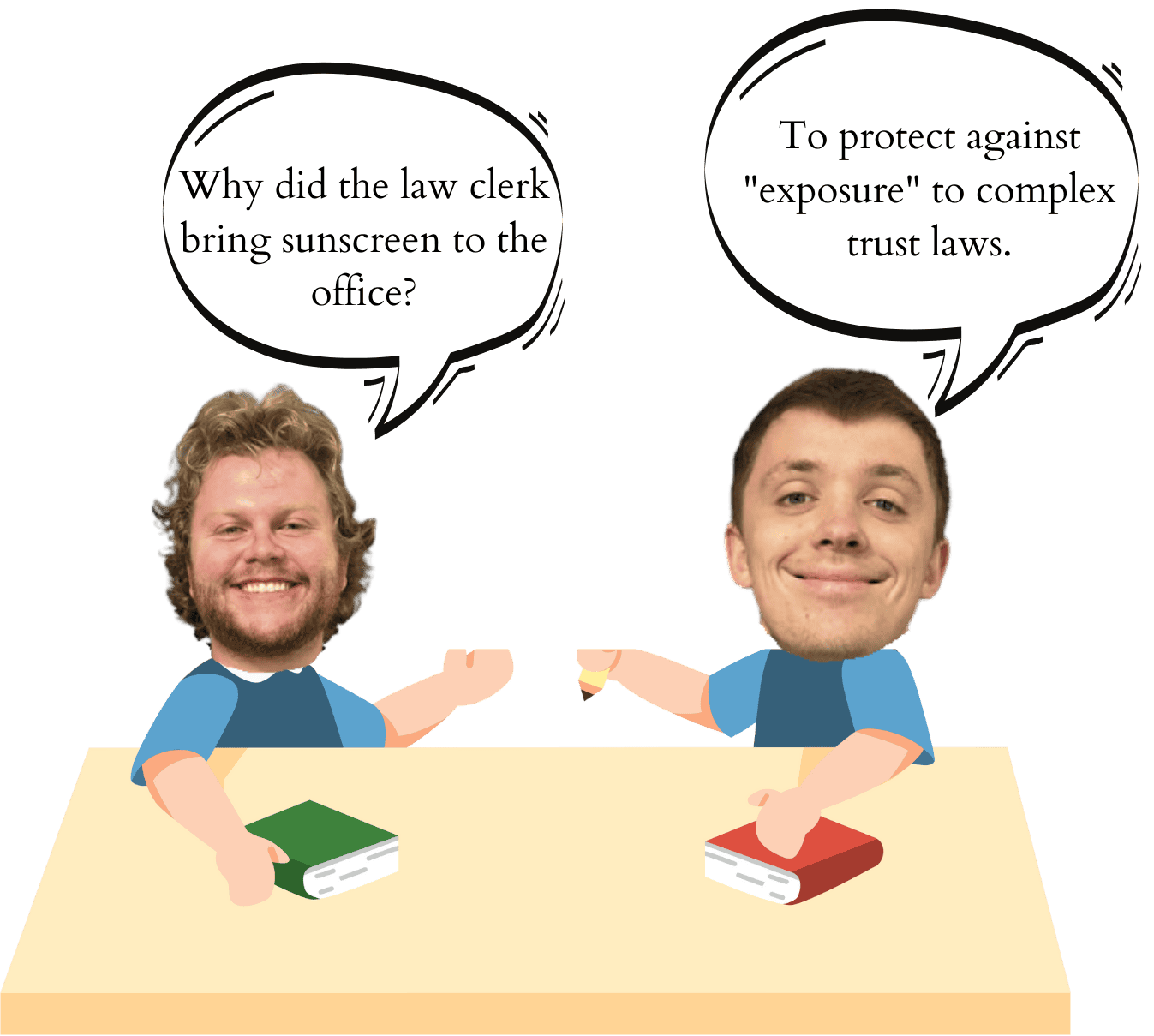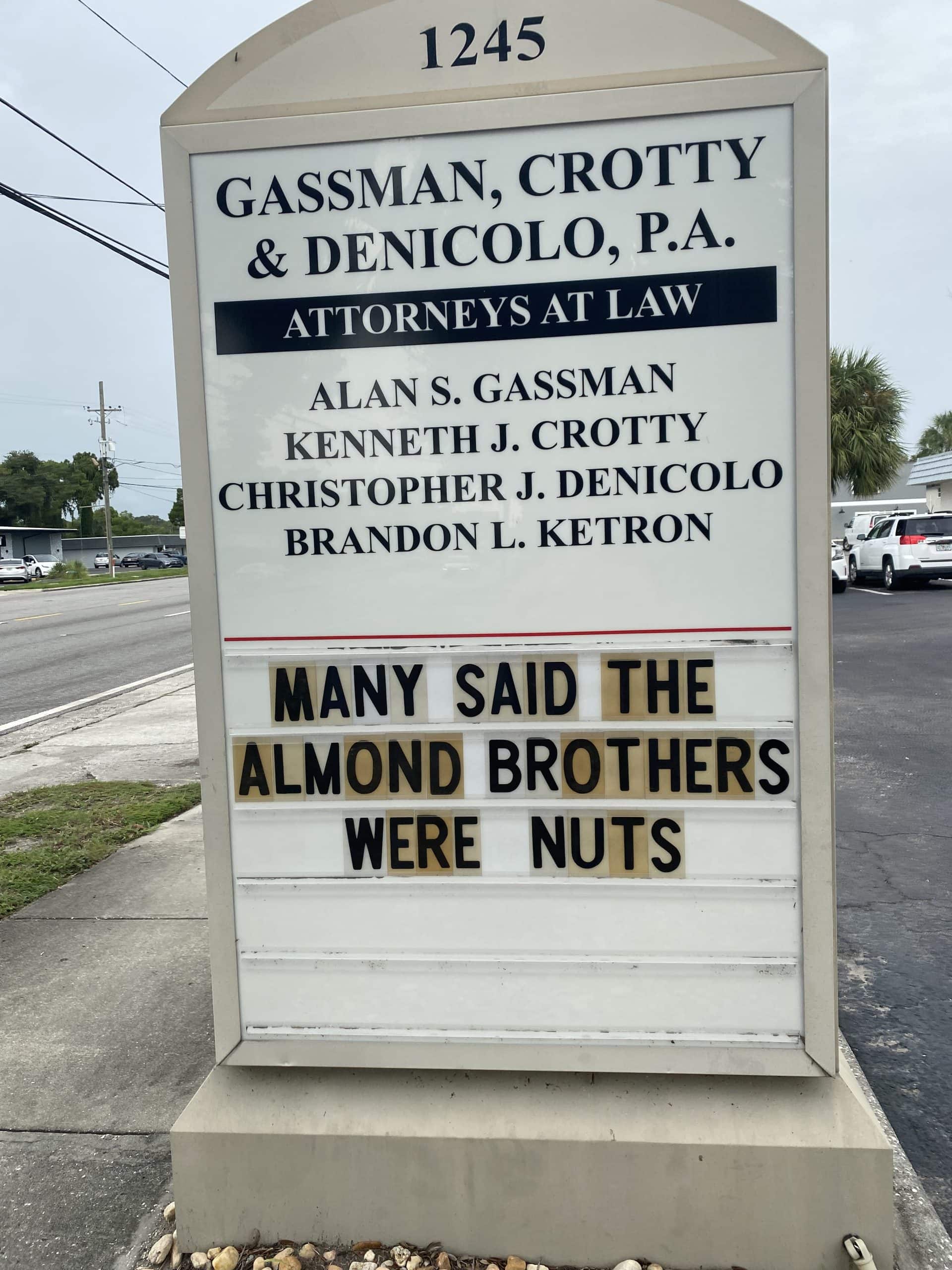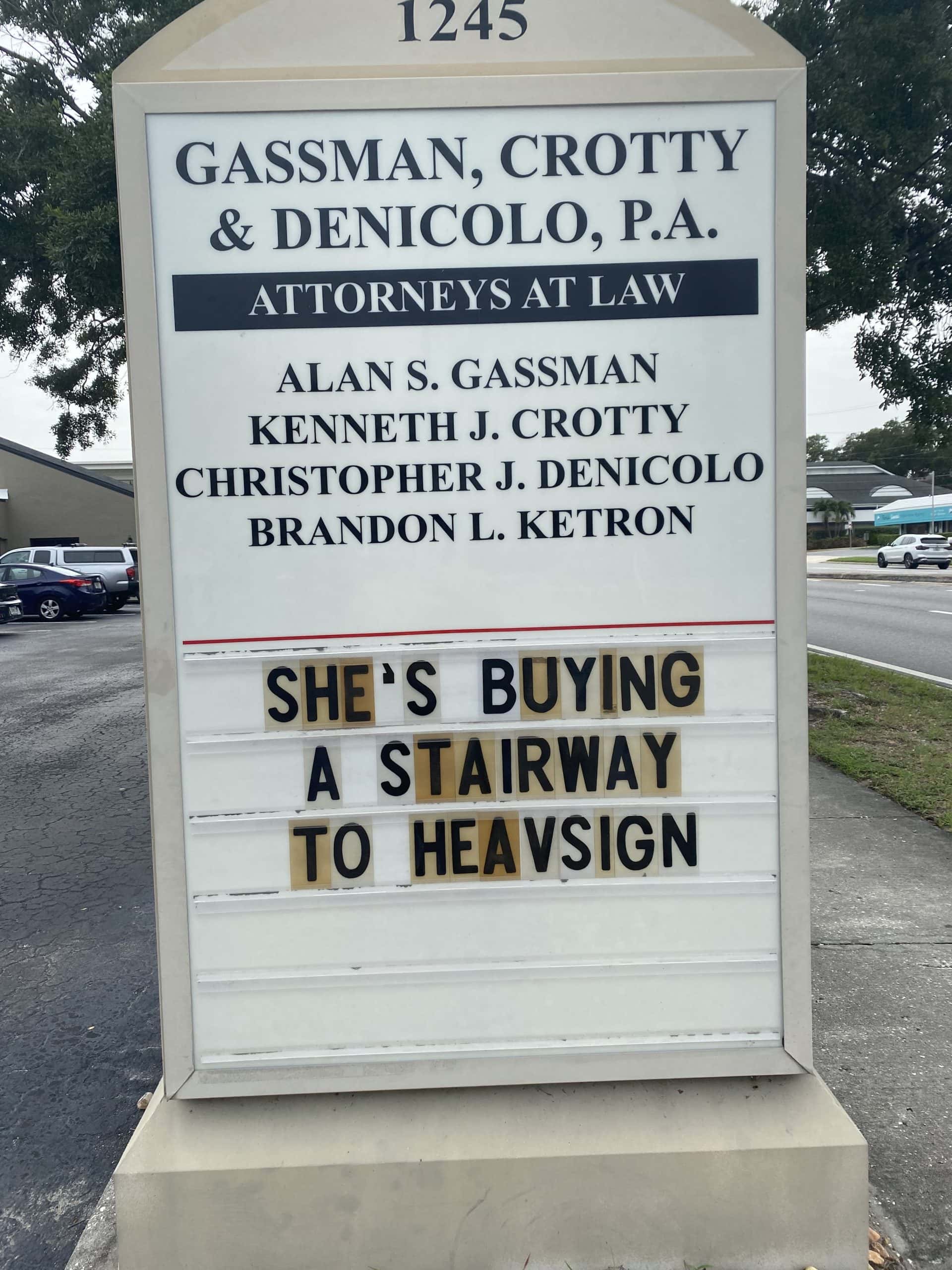8 Law Clerks, 11 Weeks, Over 3,520 Hours and 4,000 Bad Jokes – The Thursday Report – Issue 346
|
|
|||||||||||||||||||||||||||||||||||||||||||||||||||||||||||||||||||||||||
|
|
|||||||||||||||||||||||||||||||||||||||||||||||||||||||||||||||||||||||||
|
|
|||||||||||||||||||||||||||||||||||||||||||||||||||||||||||||||||||||||||
|
Thursday, August 29, 20248 Law Clerks, 11 Weeks, Over 3,520 Hours and 4,000 Bad JokesRead All About ItSummer School is in SessionIssue #346
Summer’s Legal Symphony By: Brock Exline When summer’s sun begins to shine, And Florida’s skies are clear, Our firm becomes a lively scene, With eager law clerks here.
From Stetson they arrive in droves, Jim, Chance, and Jacob too, Nick, Kurtis, Vince, and Victor, Henry joined the crew.
They bring fresh minds, a thirst to learn, In law’s vast, sprawling sea, Yet what they find within our halls Is quite the jubilee.
Our lawyers don their teaching hats, In scholar’s robes they bask, While clerks dive deep in hefty books, Completing every task.
Books are born, reports are penned, In summer’s scholarly spree, The “Thursday Report” bursts with wit, And legal oddity.
Our offices, abuzz with talk, Of cases, rules, and lore, Become a summer school of sorts, Where knowledge is the core.
So here’s to summer’s bright brigade, Who join us in our quest, To blend the law with fun and charm, And always do our best!
Let’s welcome them with open arms, And share our quirky sport, For in the heat of summer’s day, They bring their fresh support.
With pens in hand and minds engaged, We’ll laugh and learn and thrive, In this sunny season’s glow, Our firm comes more alive.
Coming from the Law Offices of Gassman, Denicolo & Ketron, P.A. in Clearwater, FL. Edited By: Brock Exline |
|||||||||||||||||||||||||||||||||||||||||||||||||||||||||||||||||||||||||
|
Please Note: Gassman, Crotty, & Denicolo, P.A. will be sending the Thursday Report out during the first week of every month. Article 1IRS Announces Second Employee Rentention Credit Voluntary Disclosure ProgramWritten By: Brandon Ketron Article 2Summer School Sizzler: Unpacking Florida’s New Marital Property Law (No Sunburns Guaranteed!)Written By: Jacob Gordon, Chance Cook and Brock Exline Article 3Summer Session Shake-Up – Florida Bill Bonanza: How Florida’s Laws Just Got TweakedWritten By: Jacob Gordon & Brock Exline Article 4Florida’s New Laws on Elder Financial AbuseWritten By: Alan Gassman, Jacob Gordon, Chance Cook and Brock Exline Article 5QPRTs: A Strategic Tool for Estate Tax Savings During Summer SchoolWritten By: Joey Kleiner For Finkel’s Followers5 Ways to Tell If A Potential Business Partner Is The OneWritten By: David Finkel Upcoming WebinarEstate Tax Planning from M – ZPresented By: Alan Gassman More Upcoming EventsYouTube LibraryHumor |
|||||||||||||||||||||||||||||||||||||||||||||||||||||||||||||||||||||||||
|
Article 1IRS Announces Second Employee Rentention Credit Voluntary Disclosure Program
Written by: Brandon Ketron On August 15, 2024, the Internal Revenue Service announced a second round of the Employee Retention Credit Voluntary Disclosure Program, whereby ineligible businesses can return ERC funds received to avoid future audits, penalties, and interest. The IRS had previously implemented a Voluntary Disclosure Program, which ended on March 22, 2024, that allowed ineligible businesses to return 80% of the ERC funds received to avoid potential penalties and interest if later audited. Now under the second ERC Voluntary Disclosure Program, ineligible businesses are required to return 85% of the funds received. In short summary, the second ERC Voluntary Disclosure Program is open through November 22, 2024, and only applies with respect to ERC funds received for the 2021 tax periods. It is noteworthy that the Voluntary Disclosure Program is not available for ERC funds received in the 2020 tax period and if businesses were ineligible for funds received in the 2020 tax period they would be required to return 100% of the funds received and may not receive amnesty from potential penalties that may apply. The second ERC Voluntary Disclosure Program requires you to complete and send an application package for the second ERC Voluntary Disclosure Program (Form 15434), voluntarily pay back the ERC funds received minus 15%, cooperate with any requests from the IRS for more information, and sign a closing agreement with the IRS. This is a very taxpayer friendly program and offers several benefits to those who voluntarily refund erroneously received ERC funds. In the recent IRS announcement, the Service made mention of the following benefits offered to taxpayers under the second Voluntary Disclosure Program: • You need to repay only 85% of the ERC you received as a credit on your return or as a refund. IRS Announcement 2024-30 provides the following with respect to whether or not a business is eligible for the second Voluntary Disclosure Program: (1) The participant is not under criminal investigation and they have not been notified that the IRS intends to commence a criminal investigation; (2) The IRS has not received information from a third party alerting the IRS to the participant’s noncompliance, nor has the IRS acquired information directly related to the noncompliance from an enforcement action; (3) The participant is not under an employment tax examination by the IRS for any tax period(s) for which the taxpayer is applying for this second ERC Voluntary Disclosure Program; (4) The participant has not been notified by the IRS that the ERC they received is being recaptured for any tax period(s) for which the taxpayer is applying for this second ERC Voluntary Disclosure Program; and (5) The participant has not previously received notice and demand for repayment of all or part of the claimed ERC. IRS.gov has several helpful information pages discussing the second ERC Voluntary Disclosure Program which are linked below: Employee Retention Credit – Voluntary disclosure program | Internal Revenue Service (irs.gov) Frequently asked questions about the second Employee Retention Credit Voluntary Disclosure Program | Internal Revenue Service (irs.gov) IRS shares more warning signs of incorrect claims for the Employee Retention Credit; urges businesses to proactively resolve erroneous claims to avoid penalties, interest, audit | Internal Revenue Service While the announcement provides that a business is not eligible for the Voluntary Disclosure Program if they are under investigation with respect to a claimed ERC credit, this only applies for the applicable Quarter in which the investigation applies. This means that other Quarters can be voluntarily returned if the employer has not yet received an audit notice or demand for repayment with respect to the ERC claim for that Quarter. For example, if an employer received a Notice of Audit with respect to its Q1 of 2021 filings, and have also claimed Q2 and Q3 ERC funds but have not yet received any Notice of Audit with respect to Q2 and Q3, the business would not be eligible for the Voluntary Disclosure Program with respect to Q1 of 2021, but would be eligible with respect to Q2 and Q3 of 2021. Many employers used outside promoters that had a financial incentive to encourage businesses to apply even though they may not be eligible, and often times misconstrued the requirements for eligibility for the ERC. This taxpayer friendly offer by the IRS provides those employers a second opportunity to come into compliance without the risk of unnecessary litigation, penalties and potential interest. If you believe that there may be a chance that your business is ineligible for ERC funds received then please reach out to us or your tax advisor for further advice and information as to how to proceed with returning the funds through the second ERC Voluntary Disclosure Program. Back to Top |
|||||||||||||||||||||||||||||||||||||||||||||||||||||||||||||||||||||||||
|
Summer School Sizzler: Unpacking Florida’s New Marital Property Law (No Sunburns Guaranteed!)
Written By: Jacob Gordon, Chance Cook and Brock Exline IntroductionIn a significant legislative move, Florida Legislature has passed House Bill 521, which amends Section 61.075 of the Florida Statutes. This bill fundamentally alters the framework for equitable distribution of marital assets and liabilities. The Bill introduced several significant changes designed to offer clearer guidelines and more equitable outcomes in divorce proceedings. It is essential for lawyers, from family law practitioners to estate planners, to comprehend these changes in order to effectively navigate this new legal landscape. Legislative HistoryOn November 17th, 2023, current District 66 Representative Traci Koster, a Tampa marital and family law attorney, filed House Bill 521. Traci Koster earned her bachelor’s degree in Legal Studies from the University of Central Florida and is an alumna of Stetson University College of Law. Koster was hand selected by Republican leaders in Pinellas and Hillsborough Counties to succeed Representative James “Jamie” Grant upon his resignation in 2020. Since then, Koster has been an active member of the Florida Legislature. There was little debate on her bill. Koster’s counterpart, Democratic Rep. Christopher Benjamin asked the only question during debate. Benjamin was quoted as asking, “What’s the Family Law Section of the Florida Bar’s position on this, or have they made a position?” Koster easily informed Representative Benjamin that the Family Law Section was “integral in drafting this bill.” With little debate, the measure passed unanimously with 117 votes in the House on February 22nd, 2024 and 38 votes in the Senate on February 28th, 2024. Governor DeSantis signed the bill into law on June 17th, 2024, and amended the statute which became effective on July 1, 2024. Revised Definition of “Good Cause” for Interim Partial DistributionsThe bill revises the definition of “good cause” to require extraordinary circumstances for interim partial distributions during dissolution actions. According to the bill, “good cause” now means “extraordinary circumstances that justify an interim partial distribution.” An interim partial distribution occurs when the divorce court orders the sale of marital property before the divorce is officially finalized. Prior to this change, Section 61.075(5)(d) of the Florida Statutes read: “As used in this subsection, the term “good cause” means extraordinary circumstances that require an interim partial distribution.” On July 1, 2025, Section 61.075(5)(d) of the Florida Statutes will change to: “As used in this subsection, the term “good cause” means extraordinary circumstances that justify an interim partial distribution.” The change from “require” to “justify” removes obligatory language in favor of permissive language, allowing the court more discretion in determining whether extraordinary circumstances exist for interim partial distributions. The bill also adds four distinct factors that courts must now consider when analyzing a partial interim distribution. Section 61.075(5)(d) continues, “In determining if extraordinary circumstances exist for the purposes of this subsection, the court must consider the following…” factors:
The addition of these four specific factors aims to provide a comprehensive framework for courts to assess the necessity and justification for interim partial distributions. By explicitly considering the potential loss of assets, the well-being of dependent children, the financial burden of legal costs, and any other extraordinary circumstances, the legislation ensures that interim distributions are granted based on a thorough evaluation of the parties’ immediate needs. This structured approach is designed to prevent unjust financial hardships during the dissolution process. This will help protect the interests of dependent children, and ensure that both parties have the necessary resources to engage in legal proceedings fairly. By delineating these factors, the bill promotes equitable outcomes and judicial consistency in making interim distribution decisions. Rule Changes to Interspousal Gifts of Real EstateThe bill stipulates that interspousal gifts of real property require a written instrument complying with Section 689.01 of the Florida Statutes. Specifically, it states: “An interspousal gift of real property may not be made in the absence of a writing that complies with the requirements of s. 689.01.” Furthermore, “The joinder of a spouse in the execution of a deed with the sole purpose of the conveyance of homestead real property to any person or entity other than the other spouse or both spouses jointly does not change the character of the real property being conveyed, or any proceeds from the sale thereof, to marital property.” Clarifications on Marital Assets and Liabilities Marital assets now explicitly include business interests in “closely held businesses”. The bill defines the standard of value for these interests: “The standard of value of a closely held business is fair market value. For purposes of this sub-subparagraph, the term ‘fair market value’ means the price at which property would change hands between a willing and able buyer and a willing and able seller, with neither party under compulsion to buy or sell, and when both parties have reasonable knowledge of the relevant facts.” Regarding goodwill in closely held businesses, the bill specifies: “If there is goodwill separate and distinct from the continued presence and reputation of the owner spouse, it is considered enterprise goodwill, which is a marital asset that must be valued by the court.” The bill maintains that all real property held as tenants by the entireties is presumed to be marital: “All real property held by the parties as tenants by the entireties, whether acquired prior to or during the marriage, shall be presumed to be a marital asset.” Similarly, personal property titled jointly as tenants by the entireties is presumed to be marital: “All personal property titled jointly by the parties as tenants by the entireties, whether acquired prior to or during the marriage, shall be presumed to be a marital asset.” Clarifications of Nonmarital Assets and Liabilities The bill clarifies that nonmarital assets will include: “Assets acquired separately by either party by noninterspousal gift, bequest, devise, or descent, and assets acquired in exchange for such assets.” The bill also clarifies the treatment of income from nonmarital assets: “All income derived from nonmarital assets during the marriage unless the income was treated, used, or relied upon by the parties as a marital asset.” Thus, all income derived from nonmarital assets, such as dividends from an investment account before the marriage, will remain nonmarital property outside the grasp of the divorce court. Liabilities incurred by forgery or unauthorized signature are also addressed: “Any liability incurred by forgery or unauthorized signature of one spouse signing the name of the other spouse. Any such liability shall be a nonmarital liability only of the party having committed the forgery or having affixed the unauthorized signature.” Burden of Proof for Claims The burden of proof to overcome the presumption of a marital asset lies with the party asserting that an asset is nonmarital. The bill clarifies: “The burden of proof to overcome the gift presumption shall be by clear and convincing evidence.” The clear and convincing evidence standard is the middle standard of proof in Florida. The lowest standard is a preponderance of the evidence which means that the evidence tips the scales slightly in the favor of one party even by just a small margin. Clear and convincing evidence means the evidence is highly persuasive and leaves no serious or substantial doubt about the issue in question. The highest standard of proof, beyond a reasonable doubt, is used exclusively in criminal cases and means that there is virtually no doubt about the truth of the claim. The bill inserted the clear and convincing standard to leave no room for argument during litigation over marital assets. Thus, the bill makes an attempt at streamlining the litigation process and removing ambiguity. ConclusionHouse Bill 521 introduces several significant amendments to the equitable distribution of marital assets and liabilities within Florida. The bill’s revisions provide clearer guidelines and aim for more equitable outcomes in divorce proceedings. Key changes include a revised definition of “good cause” for interim partial distributions, emphasizing judicial discretion and consideration of specific factors such as the potential loss of assets, dependent child expenses, legal costs, and other extraordinary circumstances. Furthermore, the bill mandates that interspousal gifts of real property require a written instrument, ensuring proper documentation and maintaining the character of such property. The inclusion of business interests in closely held businesses as marital assets, with a defined standard of value, brings clarity and consistency to the valuation process. The bill also provides clear distinctions between marital and nonmarital assets and liabilities, including the treatment of income derived from nonmarital assets incurred by forgery or unauthorized signatures. Additionally, it places the burden of proof on the party asserting that an asset is nonmarital, requiring clear and convincing evidence to overcome the presumption of a marital asset. Legal professionals, especially those in family law and estate planning, must familiarize themselves with these updates to effectively navigate the new legal landscape. ____________________________________________________________ [1] https://www.flsenate.gov/Session/Bill/2024/521/?Tab=BillHistory [2] https://www.floridabar.org/the-florida-bar-news/legislature-approves-family-law-section-backed-bill-to-standardize-divorce-proceedings/ [3] https://www.tampabay.com/news/florida-politics/elections/2020/11/03/traci-koster-narrowly-leads-in-florida-house-district-64-race/ [4] https://www.tallahassee.com/story/opinion/2024/06/20/florida-bar-applauds-desantis-in-putting-florida-families-first/74140611007/
|
|||||||||||||||||||||||||||||||||||||||||||||||||||||||||||||||||||||||||
|
|
|||||||||||||||||||||||||||||||||||||||||||||||||||||||||||||||||||||||||
|
|
|||||||||||||||||||||||||||||||||||||||||||||||||||||||||||||||||||||||||
Article 5QPRTs: A Strategic Tool for Estate Tax Savings During Summer School
Written By: Joey Kleiner A significant portion of your clients’ wealth might be tied up in their primary residence. Qualified Personal Residence Trusts (QPRTs) offer a powerful strategy to minimize estate taxes by removing this appreciating asset from your clients’ taxable estate. When considering strategies to lower projected estate tax liability, most planners and individuals are familiar with annual gifting, Credit Shelter Trusts and SLATs among other planning techniques. This article highlights the key considerations for the underutilized strategy of QPRTs, including term selection, lifetime exemption usage and potential tax basis implications resulting from 26 CFR § 25.2702-5 – “Personal residence trusts.” First, a QPRT allows the Grantor to place their house in trust for their beloved beneficiaries while retaining the right to live in the property for a number of years, the term of the QPRT. Selecting the term of a QPRT is important for two reasons: (1) if the Grantor does not survive the term then the Trust will fail; and (2) after the term the Grantor must either move out of the home or pay rent to the Trust to continue living in the house. Because the Grantor is gifting the home to the Trust, the Grantor uses a portion of their Lifetime Estate and Gift Tax exemption upon inception by making a taxable gift of the value of the remainder interest in the house. However, because the Grantor retains the right to live in the home for a certain number of years, retaining a present interest in the home, the value of the gift can NOT be reduced by the annual exclusion ($18,000 in 2024). If the Grantor fails to survive through the set term, the house is pulled back into their taxable estate and the gift from the year the Trust was established is added back to their lifetime exemption. On the other hand, once the term is over then the QPRT is the owner of the house and the Grantor must pay rent at fair market value for the remainder of the time they use the home. This can help wealthier individuals remove more taxable assets from their estate as the QPRT receives annual or monthly rental payments that can be reinvested and grow outside the Grantor’s taxable estate for the rest of the Grantor’s life. Be sure the Grantor will have enough left to make these rental payments! It is important to note that most commentators believe there is a loss of your step-up in tax basis for income tax purposes if the property sells after the retained interest term. Upon the house’s eventual sale, the income tax basis of the property will retain its value from the Grantor because the Grantor gifted the property to the Trust in life. This could mean significant capital gains tax on the sale of the residence despite the fact that the disregarded status of the QPRT allows the Grantor to exclude capital gains of up to $250,000, or $500,000 for a married couple, provided that the home is sold while qualifying as a “primary residence.” Others believe there is a way to save the income tax basis step-up, namely by providing a Power of Appointment of the Trust assets to an individual likely to die before the Grantor. This Power of Appointment must allow the designated individual to pay creditors of their estate with trust assets upon their death. Assuming the Powerholder has no creditor claims to pay, the trust assets will remain in the QPRT upon his or her passing and take the fair market value of the date of death of such individual. It can be complicated to calculate the savings from a QPRT due to the above interwoven factors and are often overlooked due to these complexities. EstateView software provides planners and individuals the ability to run the numbers on QPRTs (among many other planning techniques) to see how much the reportable year 1 gift value will be, the percent chance of the Grantor surviving the term, the amount of rent paid over the Grantor’s projected lifetime, and the estate tax savings (inclusive of the potentially higher capital gains for sale of the house in a given year after the possessory term. EstateView will show the QPRT both as part of a comprehensive plan in the “Single Client” or “Married Clients” modules and also individually in the QPRT standalone calculator. The standalone QPRT calculator even allows for side-by-side comparison to fine tune the Trust options and immediately determine the optimized scenario based on the Grantor’s objectives and preferences. For more information about EstateView, visit our website at estateview.info. |
|||||||||||||||||||||||||||||||||||||||||||||||||||||||||||||||||||||||||
|
For Finkel’s Followers5 Ways to Tell If A Potential Business Partner Is The One |
|||||||||||||||||||||||||||||||||||||||||||||||||||||||||||||||||||||||||
|
|
|||||||||||||||||||||||||||||||||||||||||||||||||||||||||||||||||||||||||
|
|
|||||||||||||||||||||||||||||||||||||||||||||||||||||||||||||||||||||||||
|
ALL UPCOMING EVENTS
|
|||||||||||||||||||||||||||||||||||||||||||||||||||||||||||||||||||||||||
|
YouTube Library
Visit Alan Gassman’s YouTube Channel for complimentary webinars and more! The PowerPoint materials can be found in the description box located at the bottom of the YouTube recording. Click here or on the image of the playlists below to go to Alan Gassman’s YouTube Library.
|
|||||||||||||||||||||||||||||||||||||||||||||||||||||||||||||||||||||||||
HUMOR
How do you know a law clerk’s assignment is up to par? An “irrevocable trust” in their abilities! What is a law clerk’s favorite part of estate planning in summer school? The “power of appointment” to take breaks. What is a law clerk’s motto in summer school? “To have and to hold, until the bar exam do us part.” Why was the law clerk always smiling in summer school? They had a “life interest” in estate planning. How did the law clerk describe their summer school experience? “It’s been a real testament to my future.” Why did the law clerk love learning about Grantor Retained Annuity Trusts in summer school? Because it was a “GRAT” way to transfer wealth. What did the law clerk say after learning about the annual exclusion? “That was a ‘gift’ of knowledge!”
|
|||||||||||||||||||||||||||||||||||||||||||||||||||||||||||||||||||||||||
|
Gassman, Denicolo & Ketron, P.A. 1245 Court Street Clearwater, FL 33756 (727) 442-1200 Copyright © 2023 Gassman, Crotty & Denicolo, P.A |
|||||||||||||||||||||||||||||||||||||||||||||||||||||||||||||||||||||||||
|
|
|||||||||||||||||||||||||||||||||||||||||||||||||||||||||||||||||||||||||

























